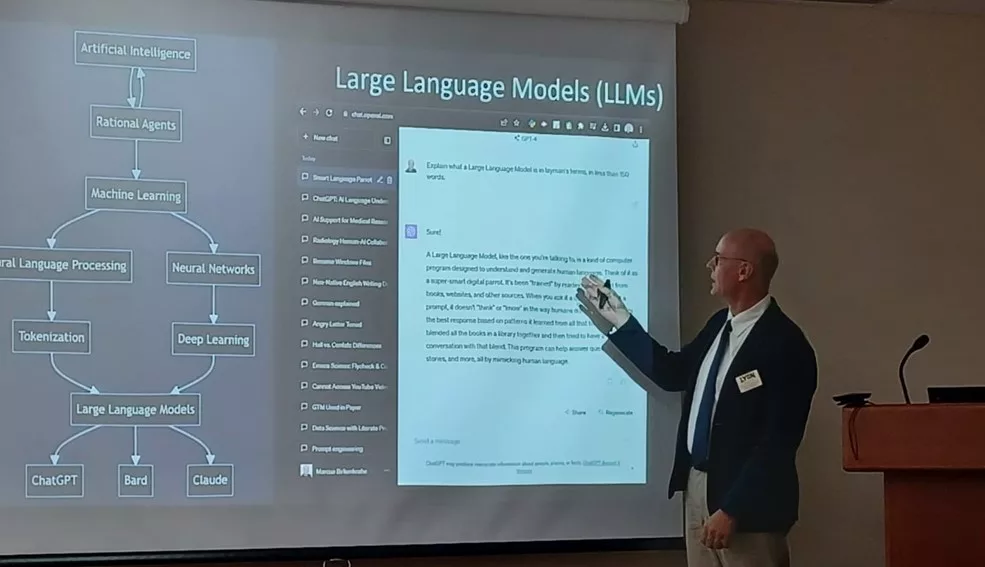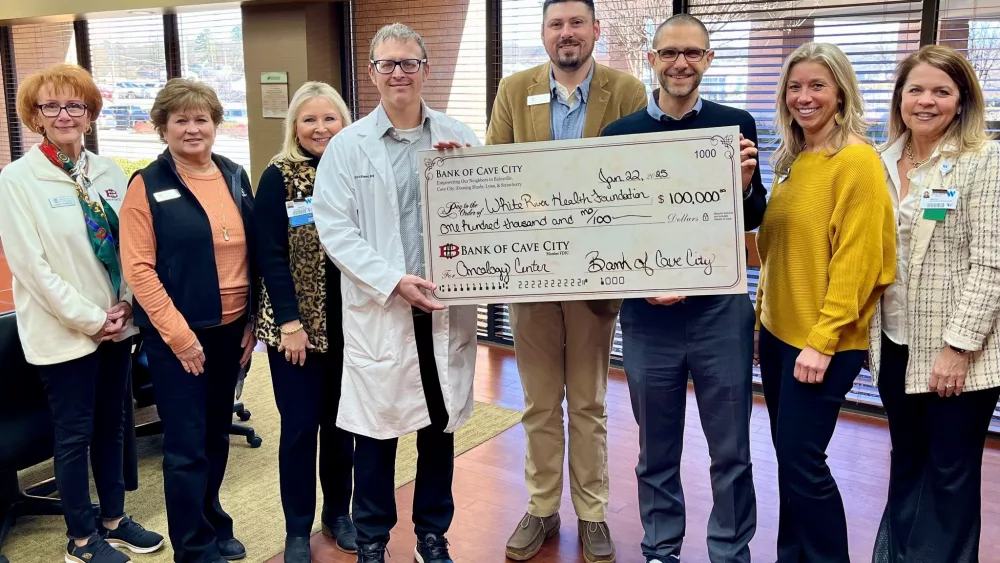
Featured image: Dr. Marcus Birkenkrahe, associate professor of computer and data science at Lyon College, shares information on the potential of artificial intelligence with residents at White River Health in Batesville.
***
Leveraging the power of AI: Enhancing research with conversational chatbots
By Colton Strader, Lyon College
BATESVILLE, Arkansas – In a recent presentation at White River Health in Batesville, Lyon College Associate Professor of Computer and Data Science, Dr. Marcus Birkenkrahe, shed light on the transformative potential of artificial intelligence, or AI, and machine learning in the realm of medical research. The focus of the talk was centered on the utilization of conversational AI, such as ChatGPT, to bolster research efforts and provide valuable support to medical residents.
Dr. Birkenkrahe delved into the heart of AI technology, tackling complex concepts such as machine learning, neural networks, and large language models, or LLMs. With an engaging approach, he demystified these key concepts, offering attendees a clearer understanding of how AI-driven chatbots like ChatGPT can enhance research efforts.
“The list of real and potential applications is very long; AI is transforming medical diagnosis, predictive analytics for patient care, drug discovery and design, and medical image interpretation,” said Dr. Birkenkrahe. “However, there is a marked disconnect between the development and deployment of AI tools. This is understandable since medicine deals with questions of life and death.”
One of the most intriguing aspects highlighted in the presentation was the ability of these chatbots to simulate human-like conversation despite their lack of genuine comprehension.
“The purpose of my talk was to explain to the residents the potential of using conversational AI like ChatGPT to support their own medical research, and in particular, help them understand the serious limitations but also the potential of this new technology,” said Dr. Birkenkrahe.
Dr. Birkenkrahe’s hope is that “residents will understand that they can benefit greatly from augmenting their work with AI.” He encouraged residents to experiment with augmenting their research with AI tools when appropriate, while maintaining critical thinking and due diligence.
During the presentation, Dr. Birkenkrahe also advised residents to incorporate AI-generated content while acknowledging their use, but highlighted issues that arise from formal citations, as such references might impact the credibility of their work.
“I actually asked one AI, claude.ai, if and how I should acknowledge or reference its help, which in my case was limited to checking language and grammar,” said Dr. Birkenkrahe.
In response, claude.ai stated, “While acknowledging the ethical use of AI assistance ethically in the acknowledgments is appropriate, formally citing AI systems as references could negatively impact the perceived credibility of the work.”
AI tools, Dr. Birkenkrahe noted, can significantly enhance research processes, including literature reviews, manuscript drafting, and overall research productivity. These tools prove especially valuable for tasks such as managing citations, doing grammar checks, and summarizing information in a quick and efficient manner. However, he highlighted the limitations of AI in creative endeavors and coding, urging caution in these areas.
“I would not recommend them for anything that requires even a little bit of creativity,” Dr. Birkenkrahe said. “This includes data visualization, interpretation, or even coding itself. The problem with using it as a programmer is that you can easily become dependent on it, and that you have to already be an expert to understand and validate the output generated by the AI.”
Dr. Birkenkrahe also noted the evolving role of resident physicians in the era of data-driven medicine. He stressed the importance of specializing and curating the libraries that learning models pull from, which can lead to more reliable and focused AI applications.
“I think the future of all serious applications lies in restricting yourself to specialized knowledge repositories that, though potentially very large, can be curated and controlled. This will give rise to chatbots that aren’t good at everything but are way more reliable at some things,” said Dr. Birkenkrahe.
Additionally, he acknowledged the current ethical gray areas surrounding the use of AI in research, particularly the integration of AI models trained on publicly available, unvalidated data.
“How useful these tools will turn out to be for researchers of any kind is also still a matter of debate: remember that we’ve only had access to them for less than one year,” said Dr. Birkenkrahe. “This technology, from a user perspective, is highly untested, and it changes fairly dramatically all the time.”
Dr. Birkenkrahe’s presentation served as a valuable guide, equipping medical residents and researchers alike, with the knowledge and insights necessary to navigate the evolving landscape of data-driven medicine, AI-augmented work, and new machine-learning applications.
Click here to view Dr. Birkenkrahe’s full presentation with speaker notes and links to the transcript, and here for more information on the Lyon College data science major and minor programs.
Article and image provided by Lyon College
Have a news tip or event to promote? Email White River Now at news@whiterivernow.com. Be sure to like and follow us on Facebook and Twitter. And don’t forget to download the White River Now mobile app from the Google Play Store or the Apple App Store.
Get up-to-date local and regional news/weather from the First Community Bank Newsroom on Arkansas 103.3 KWOZ every weekday morning and afternoon. White River Now updates are also aired on weekday mornings on 93 KZLE, Outlaw 106.5, and Your FM 99.5.

“I think the future of all serious applications lies in restricting yourself to specialized knowledge repositories that, though potentially very large, can be curated and controlled. This will give rise to chatbots that aren’t good at everything but are way more reliable at some things,” said Dr. Birkenkrahe.
Additionally, he acknowledged the current ethical gray areas surrounding the use of AI in research, particularly the integration of AI models trained on publicly available, unvalidated data.
“How useful these tools will turn out to be for researchers of any kind is also still a matter of debate: remember that we’ve only had access to them for less than one year,” said Dr. Birkenkrahe. “This technology, from a user perspective, is highly untested, and it changes fairly dramatically all the time.”
Dr. Birkenkrahe’s presentation served as a valuable guide, equipping medical residents and researchers alike, with the knowledge and insights necessary to navigate the evolving landscape of data-driven medicine, AI-augmented work, and new machine learning applications.
Click here to view Dr. Birkenkrahe’s full presentation with speaker notes and links to the transcript, and here for more information on the Lyon College data science major and minor programs.
-30-
Photo Cutline:
Dr. Marcus Birkenkrahe, associate professor of computer and data science at Lyon College, shares information on the potential of artificial intelligence with residents at White River Health in Batesville.










